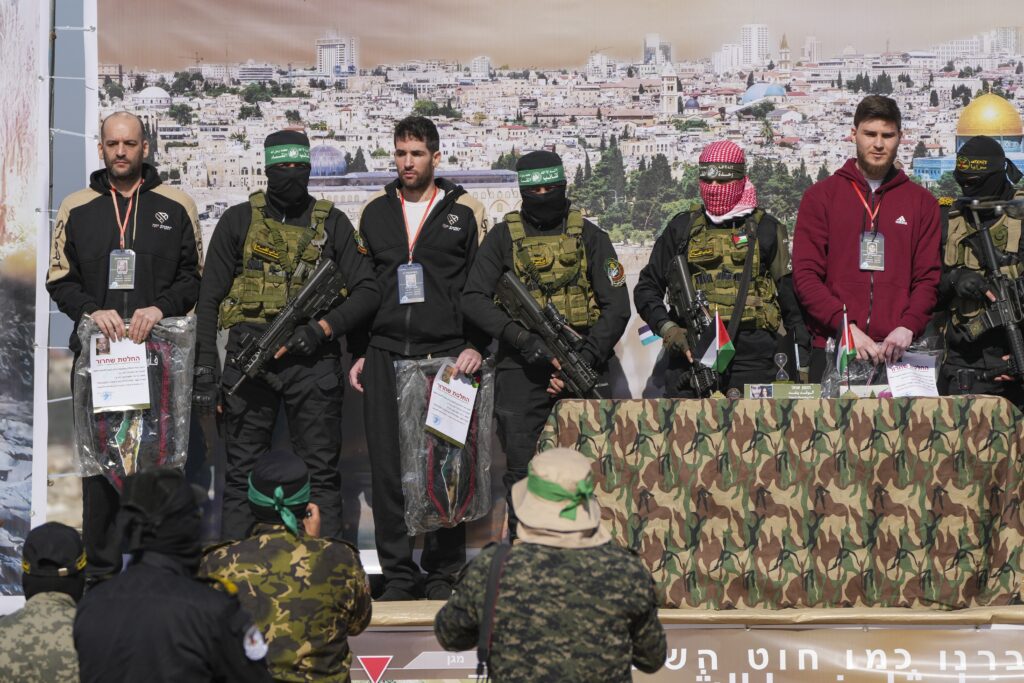Israel has reportedly informed mediating nations that it is willing to release 602 Palestinian prisoners—a move initially planned for two days ago—if Hamas immediately returns the bodies of four Israeli hostages, according to Israeli sources cited by Ynet.
The fragile ceasefire agreement between Israel and Hamas, which has brought a temporary halt to the 15-month-long conflict, requires Hamas to release hostages in phases in exchange for the release of Palestinian prisoners and a pause in Israeli military operations in Gaza. However, the process hit a roadblock after Israel insisted that Hamas stop staging elaborate public ceremonies when transferring the bodies of hostages, as it did last week with the remains of Shiri Bibas and her two young children, Ariel and Kfir, along with Oded Lifshitz.
Hamas reportedly refused to hand over the four deceased hostages until Israel followed through with its prisoner release. On Sunday, a Hamas spokesperson said that the group would not resume talks until all 602 Palestinian inmates were freed. Meanwhile, Israeli officials have denied reports of any breakthrough in negotiations.
The three-phase ceasefire, which was brokered last month, is set to conclude its first stage this coming Shabbos. While Israel insists on negotiating for the return of all hostages, Hamas has thus far refused to commit to disarmament or a demilitarized Gaza, key conditions that Israeli officials say are non-negotiable.
According to Israeli officials, three potential scenarios could unfold:
-
Negotiations for Phase Two: Israel would push for Hamas to return all hostages, agree to disarm, and allow Gaza’s demilitarization. Under this scenario, the war would come to an official end, but only if Hamas complies.
-
Renewed Military Action: If Hamas refuses to meet Israel’s demands, the IDF would resume full-scale operations to achieve its war objectives through military force.
-
Extending the Current Framework: If Hamas continues to release hostages in batches, the ceasefire could be extended while further negotiations take place. In this case, Israel would prioritize the release of fathers and hostages in need of urgent medical care, while offering further prisoner releases and increased humanitarian aid in return.
As the standoff continues, U.S. Special Envoy to the Middle East Steve Witkoff is set to arrive in the region on Wednesday to negotiate an extension of the ceasefire’s first phase. His diplomatic mission will include stops in Qatar, Egypt, Israel, the UAE, and Saudi Arabia.
This marks the first time that the Trump administration has publicly confirmed its desire to extend the first phase of the truce, amid growing speculation that Israel prefers to avoid discussions on Phase Two, which includes a full military withdrawal from Gaza.
Currently, 63 hostages remain in Gaza, including 62 who were kidnapped during the October 7, 2023, Hamas-led attack that claimed 1,200 Israeli lives. The IDF has confirmed that at least 36 of those hostages are deceased.
(YWN World Headquarters – NYC)












2 Responses
All you need to do is stop all food and fuel to Gaza. It’s simple. The gazan civilians will loot the food from Hamas. The Gazan civilians who are actually holding the hostages in their homes will give them up in exchange for food from Israeli millitary. A nation that dedclared war on the Creator cannot be when the Creator declares war on them. The Supreme Court declared no mechitzas on Yom Kippur davening so came the gazan mechitza crashing down on simchas Torah.
I don’t get it
600 prisoners for four dead bodies?
The deal should be 600 dead Palestinians for four dead Israelis, hey they love death as much as we love life…..